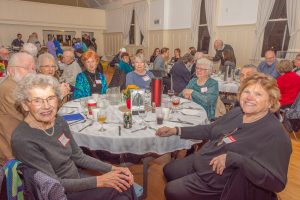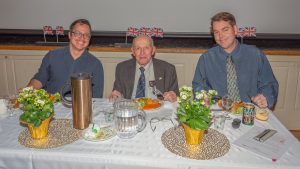
LHS director Pierce Smith, president Fred Pepin and UFV historian Scott Scheffield
Our annual Douglas Day Dinner was a well attended affair at the historic Fort Langley Community Hall. Thank you to Scott Sheffield, Associate Professor of History at the University of the Fraser Valley. His talk explored British Columbia’s relationship with the Second World War, and how many layers of community were affected by it on the home front: women, Indigenous peoples, Japanese Canadians, farmers and soldiers’ families. Artifacts that once belonged to Sir James Douglas were also on display, courtesy of the Fort Langley National Historic Site. Special thanks to Glenn Disney for taking these photos.
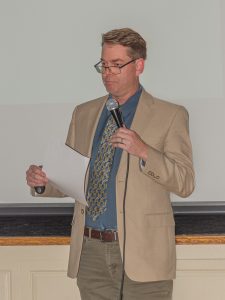
Associate professor Scott Scheffield continues to research how the Second World War affected British Columbians.
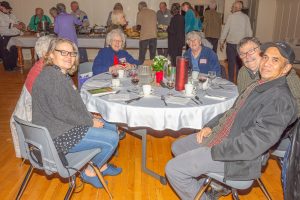
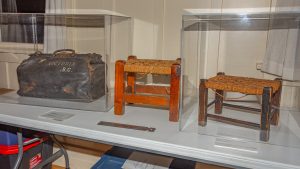
James Douglas artifacts: travel bag, replica of his foot stool, metal mace used to declare the colony, and the original foot stool that he travelled with. Thanks to Pierce Smith for sharing them from the Fort Langley National Historic Site collection.
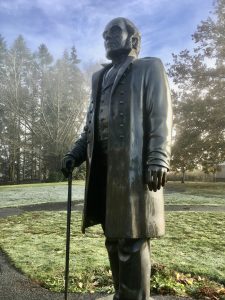
Sir James Douglas, National Historic Site
A Toast to Sir James
Welcome to our Society’s annual salute to a BC pioneer: he was the right man, at the right time. Of course, James Douglas had his critics. He was an autocrat and fell out of favour politically. But in his role as the Governor of Vancouver Island and the Mainland Colony of British Columbia, he forged alliances that helped preserve this as British territory. In fact, he declared the colony of British Columbia here in Fort Langley in November of 1858.
Douglas was of mixed blood — his father was Scottish, and his mother was a creole woman from Guyana. As he rose through the ranks of the Northwest Company and Hudson’s Bay Company, he married Amelia Connolly, a Metis woman. She saved his life on at least one occasion. He forged strong trading links with First Nations, and as governor, signed the first treaties on Vancouver Island
Douglas invited Blacks from the US to come to B.C. for the gold rush and allowed them to form a militia in Victoria. He built alliances with other minorities to help maintain a British colony – instead of the next American state.
Our awareness of British Columbia’s multicultural history has deepened in recent years. James Douglas was most certainly a figure ahead of his time. Perhaps he has some lessons for today. Please raise your glass in a toast to Sir James Douglas.
